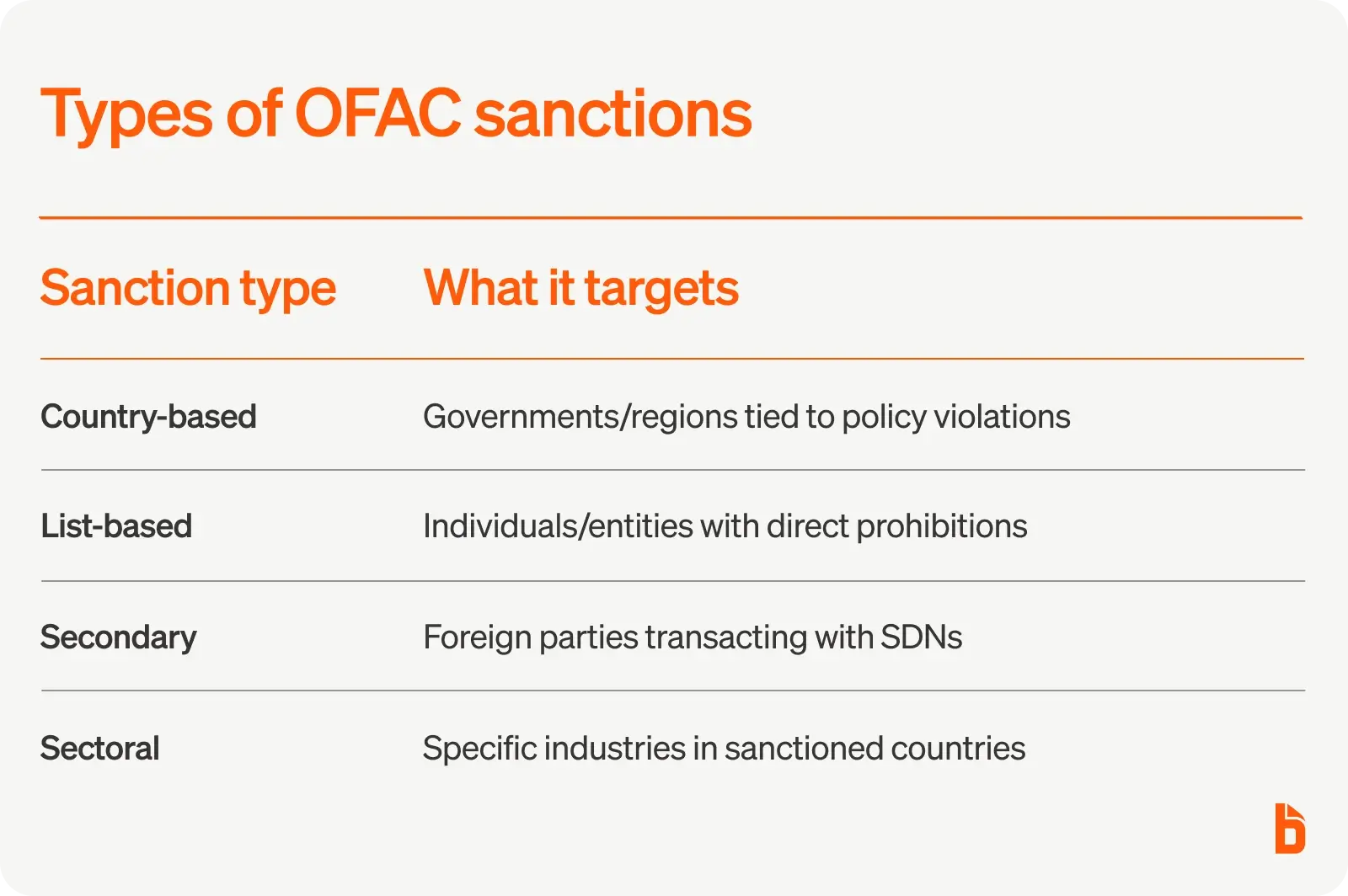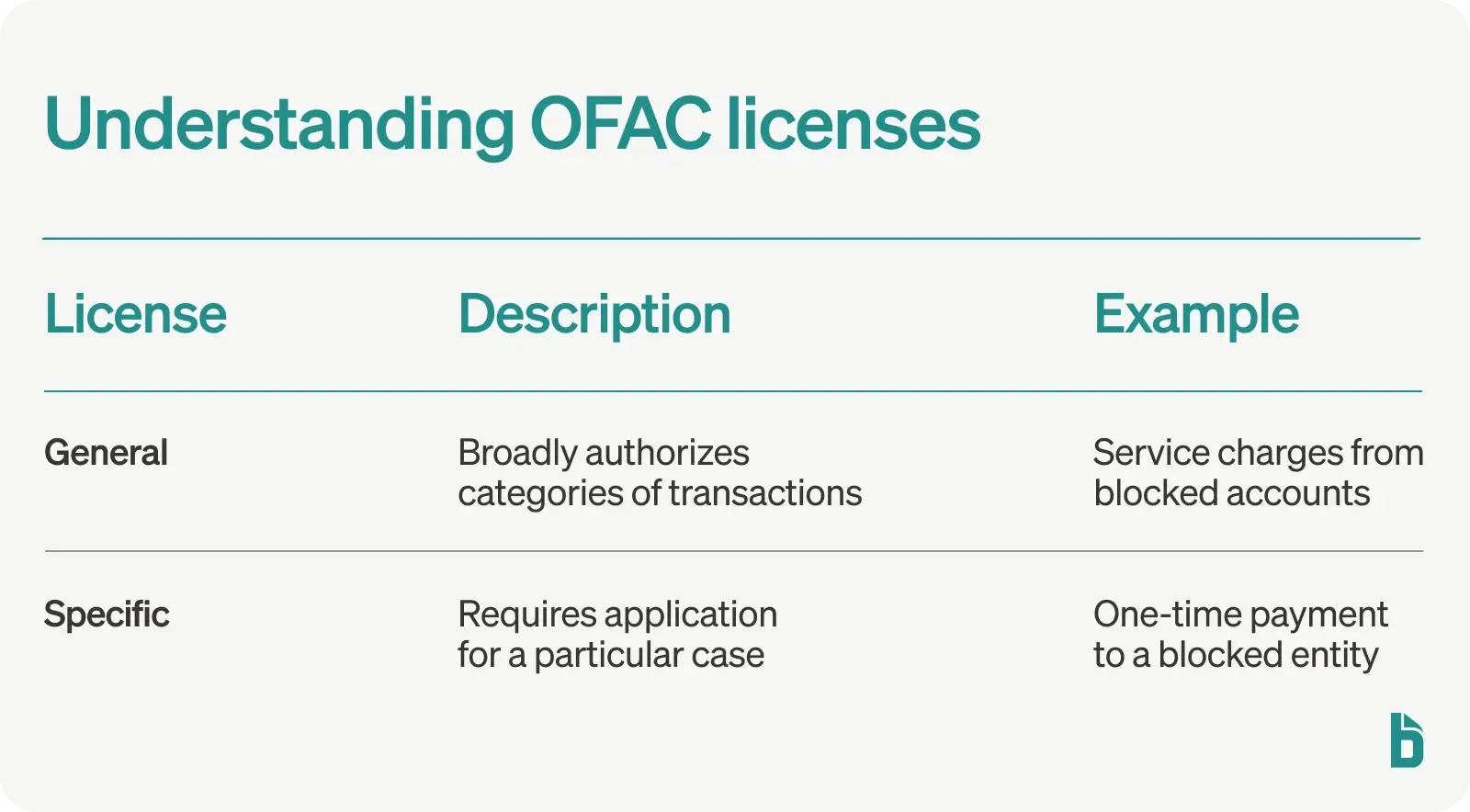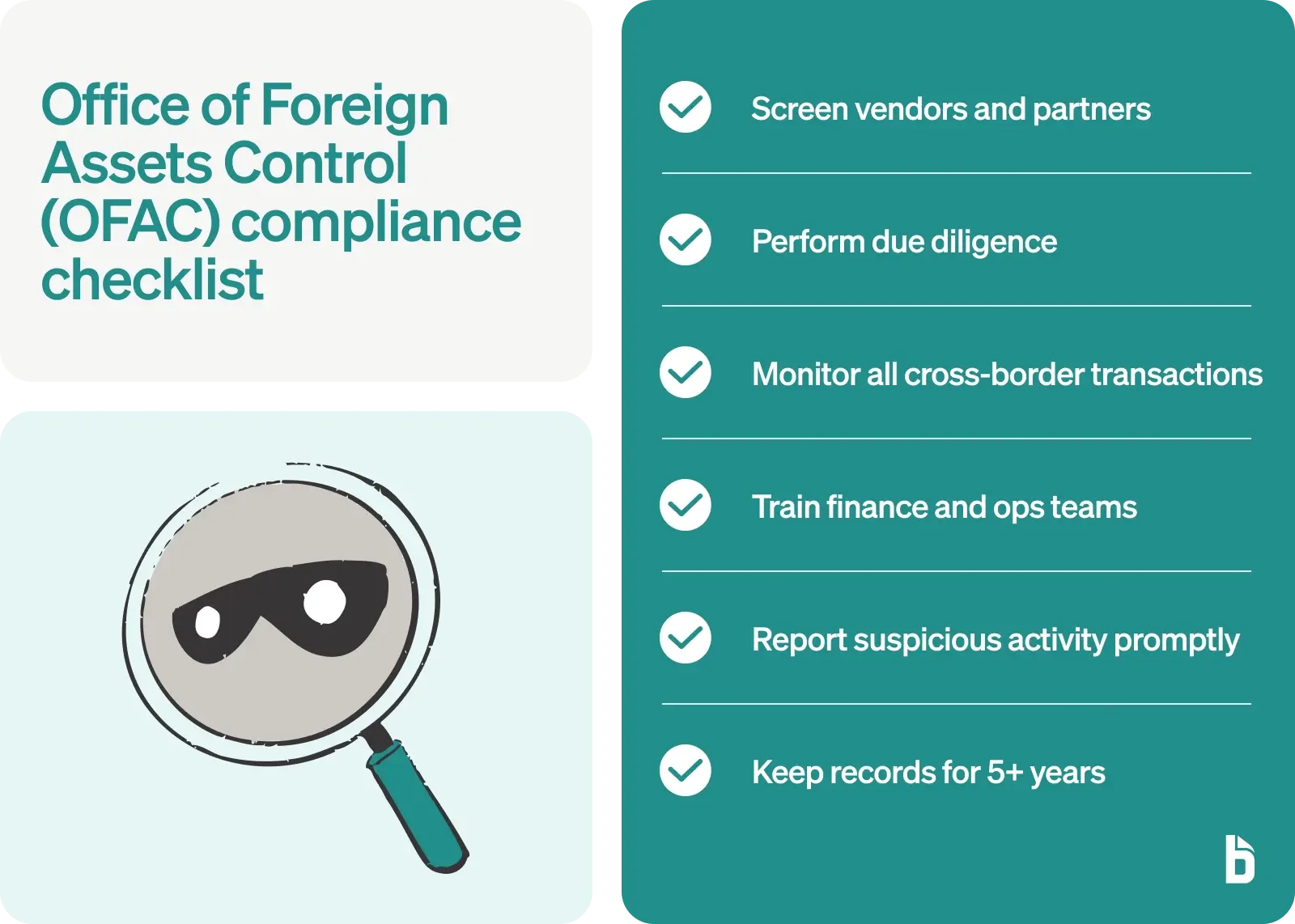OFAC is a common acronym in business and banking, but what does OFAC stand for? The acronym OFAC stands for “Office of Foreign Assets Control”. The OFAC is an important part of the U.S. Department of the Treasury and holds the crucial task of administering and enforcing economic and trade sanctions of individuals, entities, and organizations that have links to banned countries, narcotics traffickers, terrorists, and other threats to national security.
Purpose of OFAC
The OFAC is in charge of ensuring compliance with any sanctions or other foreign policy objectives and regulations established by the U.S. government to protect national security.
Since the global market engaging in international transactions grows more common, including for businesses of various sizes, the OFAC helps reduce risks associated with international trade and business.
The OFAC places economic sanctions and trade sanctions on individuals and entities such as:
- Foreign countries that have been sanctioned
- Regimes
- Terrorists
- International narcotics traffickers
- Anyone involved in distributing weapons of mass destruction
These sanctions and regulations are put in place as a way to discourage illegal activities and promote stability on a global level.
Many of the regulations that OFAC enforces are based on guidelines set by the United Nations or other global mandates.
Experience how BILL’s accounts payable and accounts receivable platforms streamline financial processes, including OFAC screening, to help you avoid inadvertent dealings with unauthorized entities.
What are OFAC economic and trade sanctions?
The Office of Foreign Assets Control’s (OFAC) economic and trade sanctions are a set of measures imposed by the U.S. government to promote national security and foreign policy objectives.
These sanctions are aimed at countries, individuals, entities, and organizations that are involved in activities deemed detrimental to U.S. interests or international norms.
OFAC oversees and enforces these sanctions to ensure compliance and deter prohibited transactions.
The primary goal of these sanctions is to disrupt the economy and everyday life of the targeted entities, influencing their decisions and behavior within the global community without resorting to armed conflict.
The sanctions may include measures such as:
- Asset Freezes: Locked the assets of designated individuals, entities, or governments away and preventing them from accessing their financial resources.
- Trade Restrictions: Imposing restrictions on importing and exporting specific goods and services to and from the targeted countries or entities.
- Prohibitions on Financial Transactions: Blocking or prohibiting financial transactions and dealings with designated parties, making it challenging for them to access the U.S. financial system.
In addition, there are several different types of sanctions that exist, each serving distinct purposes and containing various regulations.

Country-based Sanctions
Country-based sanctions are typically imposed in response to specific transactions or actions of interest from foreign governments. These sanctions target certain industries or sectors within a country, prohibiting activities such as trade, financial transactions, and technology transfers.
For example, a country's government or state-owned enterprises may face restrictions due to human rights abuses or national security concerns. These sanctions aim to disrupt the economy and daily life of the targeted nation, applying pressure to encourage a change toward more respectful and peaceful behavior.
List-based Sanctions
List-based sanctions are a powerful tool used by OFAC to achieve foreign policy objectives, protect national security, and safeguard the U.S. economy. The Specially Designated Nationals and Blocked Persons (SDN) List is maintained by OFAC and includes individuals, entities, and organizations deemed to pose a threat to U.S. interests.
Transactions with those listed on the SDN List are strictly prohibited. The individuals and entities on this list have been shown to engage in activities such as narcotics trafficking, terrorism, cybercrimes, and human rights abuses.
Secondary Sanctions
In recent years, the U.S. government has increasingly employed secondary sanctions. These sanctions target foreign individuals or entities that engage in transactions with parties already sanctioned by the U.S.
This approach aims to discourage non-U.S. actors from providing support to sanctioned entities. If a non-U.S. company continues to do business with a sanctioned entity, the U.S. government may impose secondary sanctions on that company, resulting in a loss of access to the U.S. financial system and market.
Sectoral Sanctions
Sectoral sanctions focus on specific sectors of a country's economy and are usually imposed in response to particular events or actions by foreign governments. These sanctions aim to change behavior by impacting specific industries while minimizing the impact on non-targeted sectors.
For example, after Russia's annexation of Crimea, the U.S. imposed sectoral sanctions on select firms in Russia's financial and energy sectors, cutting off their access to the U.S. financial system and market.
Compliance with OFAC sanctions is mandatory for all individuals and entities subject to U.S. jurisdiction, including U.S. citizens, residents, companies, and foreign entities operating within or conducting business with the United States. Ignoring or violating these sanctions can lead to severe penalties, including hefty fines, criminal charges, and reputational damage.
To navigate the complexities of OFAC economic and trade sanctions, businesses must implement robust screening processes, conduct due diligence on potential business partners, and closely monitor financial transactions to detect any suspicious activities. Ensuring compliance with OFAC trade sanctions-based regulations is not only a legal obligation but also a critical step in safeguarding businesses and maintaining a secure global business environment.
What bank transactions are subject to OFAC regulations?
Under the Office of Foreign Assets Control (OFAC) regulations, certain bank transactions are subject to scrutiny and potential blocking if they involve individuals, entities, or countries designated by OFAC as a threat to U.S. national security and foreign policy objectives.
These regulations aim to prevent transactions that could potentially support illegal activities or entities that pose risks to national security goals or to the international community.
Bank transactions subject to OFAC regulations include, but are not limited to:
International wire transfers
Any international funds transfer — or wire transfer — that involves an unauthorized party designated by the OFAC must be blocked. This means that the transfer will be halted, and the funds will not be allowed to proceed to the designated individual, entity, or country.
Bank accounts and assets
Any assets or accounts held by or belonging to an OFAC-specified individual, entity, or country may be subject to restrictions if they are located within the United States or are held by U.S. citizens or entities. This can include bank accounts, investment accounts, and other financial assets.
Offshore bank transfers
Even if an offshore bank transfer is routed through a U.S. bank to an offshore bank, it must be blocked if an OFAC-designated party is involved in the transaction. The involvement of an OFAC-sanctioned entity in the transaction can trigger a block, regardless of where the funds are transferred.
Transactions involving foreign branches and subsidiaries
OFAC laws and regulations apply not only to companies owned by U.S. persons and domestic agencies but also to foreign branches and overseas subsidiaries of U.S. companies.
Transactions conducted through these foreign entities are subject to OFAC scrutiny and must comply with the regulations.
Non-compliance with OFAC regulations can have serious consequences, including delayed payments, blocked transactions, and potential legal and financial penalties. Financial institutions, including banks, are required to implement robust compliance measures to ensure that their transactions do not involve OFAC-sanctioned entities or countries.
BILL complies with OFAC regulations and has a robust OFAC compliance program. Try our AP and AR automation systems today.

What are OFAC licenses?
Special circumstances or exceptions can make it so that prohibited transactions are allowed. These exceptions are made by OFAC licenses that grant authorization for specific activities that would otherwise be restricted.
Obtaining one of these OFAC licenses requires an application with proper documentation detailing the proposed transaction and the OFAC determining it does not undermine U.S. policy. The process can be complex, and it's essential to work with experts who understand the intricacies of OFAC regulations.
There are two types of OFAC licenses, each serving a different purpose:
General OFAC license
The first type of license the OFAC offers is a general license. This type of license will authorize specific categories of transactions.
One way a general license could be used is to allow service charges to be collected from blocked accounts. If there weren’t a license, each of these transactions would need to be reviewed on a case-by-case basis.
Specific OFAC license
A specific OFAC license is used to authorize one specific transaction or set of transactions and is done on a case-by-case basis rather than for a whole category of transactions.
If someone claims to have a general or specific license, the bank they are working with will need to verify that the license is correct and valid. It would also be wise for the bank to have a copy of the license for their records in case there are any issues.

OFAC reporting and compliance
For companies involved in international transactions, strict adherence to the rules set forth by the Office of Foreign Assets Control (OFAC) is of utmost importance. Failure to comply with OFAC sanctions can result in severe consequences, including:
- Substantial fines
- Reputational damage
- Potential criminal charges
Therefore, ensuring an effective OFAC compliance program should be a top priority for all businesses operating on the global stage. Here are some key steps to help banks ensure they are OFAC compliant:
Robust screening processes
Implementing advanced screening procedures is essential to check customers, suppliers, partners, and other third parties against OFAC's sanctioned individuals and entities list.
Due diligence
Thorough due diligence on prospective business partners and clients is critical, especially in high-risk regions or industries. Documenting these due diligence and risk assessment efforts helps maintain detailed records and ensures that compliance measures are well-documented.
Transaction monitoring
Regularly monitoring financial transactions is essential to identifying and preventing suspicious activities related to sanctioned entities.
Employee training
Educating employees about OFAC regulations and the importance of compliance is vital.
Reporting OFAC violations:
In the unfortunate event of a potential OFAC violation, timely reporting is crucial. The U.S. Treasury Department considers voluntary self-disclosure of violations as a mitigating factor in penalties.
If a U.S. bank receives instructions for a transfer involving an OFAC-designated party, it must execute the payment order and place the funds into a blocked account. The bank must report the blocked or prohibited transaction to OFAC within 10 business days and annually report the blocked assets.
Records of rejected transactions must be kept for at least five years, while blocked assets' records must be maintained for the duration they are blocked and five years thereafter.
How banks or companies should report possible risks:
- Gather all relevant information to support suspicions of a possible violation, including documents and emails.
- Report a possible violation to OFAC by calling their hotline or sending an email.
- Provide as much detail as possible about the incident, including the parties involved, the nature of the transaction, and any other relevant information.
- Optionally, report the possible violation anonymously.
- Follow up with OFAC to ensure receipt of the report and check the investigation's status.
Track your transactions easily with BILL
Being OFAC compliant is crucial, so you should have a finance system that helps support you in your OFAC compliance efforts. BILL is more than just a financial management platform — it's your ally in navigating OFAC compliance complexities.
Our cutting-edge AP and AR automation technology offers several features to facilitate your compliance efforts. Try BILL today and begin streamlining your finance efforts.


